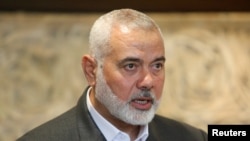China's Foreign Ministry on Tuesday acknowledged a meeting between its diplomat Wang Kejian and the political leader of the Palestinian militant group Hamas, Ismail Haniyeh, on Sunday in Qatar to discuss the conflict in Gaza. In a short statement, the ministry said Wang and Haniyeh discussed the conflict but did not elaborate.
The meeting is the first announced to have taken place between the Chinese envoy and Hamas since the militants attacked Israel on October 7, killing about 1,200 Israelis and taking about 250 hostage.
Israel's counteroffensive in Gaza has killed nearly 32,000 Palestinians, two-thirds of them women and children, Gaza health officials say. The Israeli military says it has killed thousands of Hamas fighters.
The meeting came just days after Wang met separately with officials from Israel and from the Palestinian Authority as part of Beijing's efforts at diplomacy.
The Jerusalem Post reports Hamas on Sunday night said Haniyeh told Wang the war must end quickly, the Israel Defense Forces must withdraw from Gaza and an independent Palestinian state needs to be established. Hamas says Wang assured Haniyeh "the Hamas movement is part of the Palestinian national fabric, and China is keen on relations with it."
Critics say Beijing's efforts to mediate will be hampered by its relations with Hamas — which is labeled a terrorist group by Egypt, Israel, Japan, the EU and the United States — and by its failure to condemn the militants' October 7 attack.
"In light of China's actions and declarations from October 7, Israel does not consider China a fair or relevant party," said Galia Lavi, deputy director of the Israel-China Policy Center at the Israel Institute for National Security Studies.
"Beijing's declarations almost claim that this war was started because of Israel," Lavi told VOA. "At the same time, China still altogether ignores Hamas' actions on October 7."
Lavi argued that despite China's claims of attempts to foster Israeli-Palestinian ties, it is hampering prospects.
"China's repeated calls for the so-called right of return are harming any future talks between Israel and the Palestinians and pose a blatant interference in Israel's internal affairs," Lavi said.
The call for a Palestinian right of return stipulates allowing reabsorption of approximately 5 million Palestinians, including their descendants, driven from their lands to nearby Syria, Egypt, Jordan and Lebanon during Israel's 1948 War of Independence.
"Chinese officials have also made it quite clear that China is standing by terror through their meetings with Hamas leaders. With that state of things, I am not optimistic about China-Israel relations in the future," Lavi concluded.
Wang met Thursday in Jerusalem with Hagai Shagrir, the head of Israel's Foreign Ministry Asia and Pacific Bureau, and Rachel Feinmesser, the head of the bureau's Policy Research Center.
An Israeli Foreign Ministry spokesperson confirmed meetings took place but did not elaborate on the details or outcomes.
"On the agenda was an exchange of views on the Israel-Hamas war and regional as well as bilateral issues," the spokesperson told VOA.
A day earlier, Wang met with Palestinian Foreign Minister Riyad al-Maliki in Ramallah.
According to China's Foreign Ministry, Wang expressed deep concern about the nearly six-month conflict in Gaza and the acute humanitarian situation.
"China will continue to work with the international community to stop the fighting as soon as possible and to make unremitting efforts to promote a comprehensive, just and lasting solution to the question of Palestine based on the two-state solution," Wang was quoted by the Chinese Foreign Ministry as saying.
Following the Ramallah meetings, the Palestinian Authority's Foreign Ministry issued statements expressing al-Maliki's appreciation for China's "firm position in supporting the Palestinian people, the establishment of a Palestinian state and the right of the Palestinian people to self-determination."
Al-Maliki also briefed Wang on "catastrophic conditions" for Palestinians in the Gaza Strip.
A U.N.-backed report released on Monday warns that the Israeli campaign will imminently drive famine in Gaza.
In his briefing to China's envoy, al-Maliki voiced concern about alleged "violence and terrorism" perpetrated by Israeli forces in West Bank and East Jerusalem Palestinian communities and an "escalation in settler terrorism" in those communities.
According to the Palestinian Authority, Wang responded by calling for an international peace conference "as soon as possible" to launch a "credible peace process based on international law and internationally legitimate resolutions."
But analysts say China's influence in the region is limited.
Ghassan Khatib, a professor of international studies and political science at Birzeit University in the West Bank, told VOA that China plays an important but limited role for the Palestinian population.
"So although we look to Chinese support because it carries huge political weight internationally, it's mainly political support — not material."
Janes Defense correspondent and independent Palestinian strategist Mohammed Najib elaborated: "The Chinese Communist Party is one of the parties in the world most supportive of the Palestinians as a liberation movement."
He dismissed Wang's meeting Sunday with Hamas' Haniyeh, saying, "China also recognizes and deals with the [Palestinian Authority] as the legitimate representative body of the Palestinians and does not deal with Hamas."





